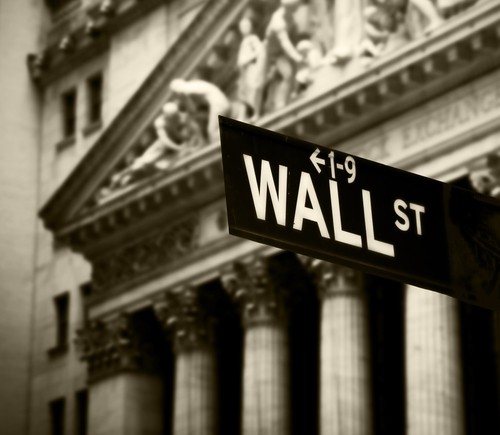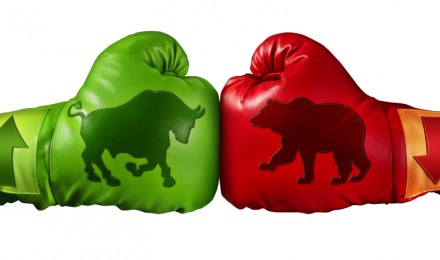We all know the natural cycle of the stock market. It goes up, it corrects, and it comes back down. As people keep buying into the market, it will often get overvalued. This means that the underlying stocks are worth more because of the demand rather than because of the company that is issuing them. If the market becomes overvalued, it is ready for a correction. During the correction the market will drop back down to a sustainable level. If you are actively managing your portfolio, you will want to know these signs of an overvalued market.
CAPE Ratio is High
Yale professor Robert Shiller developed a method of looking at the average of Price-to-Earning ratios in the S&P 500 index. The ratio, sometimes call Shiller’s CAPE or P/E10 is calculated by taking the S&P 500’s current price and dividing it by the average of the earnings for the past 10 years. You can learn more here and see a chart of the CAPE ratio here.
High P/E Ratios
Along those lines you can do your own valuations as well. The stock market is loosely based on how much companies earn. But the price per share is inflated. So if a company earns $5 per share, but the shares are worth $20, the price to earnings, or P/E ratio, is 4. The higher the P/E ratio the more overvalued the stock is. Unfortunately you have to look at the historical values to determine what overvalued is for each individual issue.
Market Has Posted Consistent Gains
Upticks in the market are not a bad thing, and they are not necessarily an indication that the market is overvalued. However, after a long period of consistent gains, it is reasonable to expect that the market is reaching its upper limit.
Market Cap vs GNP
The Gross National Product is the size of the US Economy (similar to the Gross Domestic Product). When looking at the Total Market Cap as a percentage of the GNP, one can get a feel for how the stock market is doing. When the ratio gets higher, 90% or more, the market is getting overvalued.
Yield on 30 Year Treasuries Rising
If the economy starts to struggle, the Fed will lower interest rates to help keep things moving. Doing so causes borrowing money to become a lot cheaper, however, it also causes yields on long term treasury bonds to drop as well. When money becomes cheaper, companies can access cash easier, and the market tends to climb. As the market becomes overvalued rates will start to rise again in order to stave off inflation.
High valuation in the stock market does not necessarily mean that the market is overvalued. In fact, it can still be undervalued after quite the climb (especially coming out of a recession). In order to accurately determine if the market is overvalued, you have to look at many different indicators simultaneously. When the market does become overvalued, a correction is usually imminent. However, a correction does not mean a drop in value. It can mean that the market levels off for a few months in order to reach equilibrium. If you are watching your investments, pay close attention to these indicators. When signs are pointing to the market being overbought, then it may be a good time to harvest your gains and look for stocks that are still undervalued.
We all know the natural cycle of the stock market. It goes up, it corrects, and it comes back down. As people keep buying into the market, it will often get overvalued. This means that the underlying stocks are worth more because of the demand rather than because of the company that is issuing them. If the market becomes overvalued, it is ready for a correction. During the correction the market will drop back down to a sustainable level. If you are actively managing your portfolio, you will want to know these signs of an overvalued market.
CAPE Ratio is High
Yale professor Robert Shiller developed a method of looking at the average of Price-to-Earning ratios in the S&P 500 index. The ratio, sometimes call Shiller’s CAPE or P/E10 is calculated by taking the S&P 500’s current price and dividing it by the average of the earnings for the past 10 years. You can learn more here and see a chart of the CAPE ratio here.
High P/E Ratios
Along those lines you can do your own valuations as well. The stock market is loosely based on how much companies earn. But the price per share is inflated. So if a company earns $5 per share, but the shares are worth $20, the price to earnings, or P/E ratio, is 4. The higher the P/E ratio the more overvalued the stock is. Unfortunately you have to look at the historical values to determine what overvalued is for each individual issue.
Market Has Posted Consistent Gains
Upticks in the market are not a bad thing, and they are not necessarily an indication that the market is overvalued. However, after a long period of consistent gains, it is reasonable to expect that the market is reaching its upper limit.
Market Cap vs GNP
The Gross National Product is the size of the US Economy (similar to the Gross Domestic Product). When looking at the Total Market Cap as a percentage of the GNP, one can get a feel for how the stock market is doing. When the ratio gets higher, 90% or more, the market is getting overvalued.
Yield on 30 Year Treasuries Rising
If the economy starts to struggle, the Fed will lower interest rates to help keep things moving. Doing so causes borrowing money to become a lot cheaper, however, it also causes yields on long term treasury bonds to drop as well. When money becomes cheaper, companies can access cash easier, and the market tends to climb. As the market becomes overvalued rates will start to rise again in order to stave off inflation.
High valuation in the stock market does not necessarily mean that the market is overvalued. In fact, it can still be undervalued after quite the climb (especially coming out of a recession). In order to accurately determine if the market is overvalued, you have to look at many different indicators simultaneously. When the market does become overvalued, a correction is usually imminent. However, a correction does not mean a drop in value. It can mean that the market levels off for a few months in order to reach equilibrium. If you are watching your investments, pay close attention to these indicators. When signs are pointing to the market being overbought, then it may be a good time to harvest your gains and look for stocks that are still undervalued.







